- Home
- Madeleine L'engle
The Young Unicorns Page 2
The Young Unicorns Read online
Page 2
“No,” she said.
He rubbed her hands for a moment more in silence, then asked, “What is bothering you?”
“Nothing. I don’t want to talk about it.”
“Something at school?”
“No.”
“But there is something. Yes. Bigger than something at school. I can feel it in your hands. All right. Play, and we will see what you tell me.”
“I won’t tell you anything.”
“You think you can hide yourself from me when you play, hah?”
“We’ll see.” Emily sounded grim, then gave an unexpected giggle. “Shall I start with the G minor fugue?”
Mr. Theo looked at her suspiciously. “If you think your fingers are limber enough.”
She adjusted the piano bench carefully, then held her hands out over the keyboard, flexing them before starting to play. Rob sat straight on the little gold sofa. Dave slouched on the end of his spine in the leather chair and put his feet on the brass fender. Mr. Theo scowled and waited.
Emily began to play. After less than a minute Mr. Theo roared, his yellowed mane seeming to rise in rage from his bulbous forehead, “And what in the name of all I treasure is that?”
She stopped, turning her face towards his voice with an expression of wounded surprise. “You told me last week that I was to learn that fugue backwards and forwards. That’s backwards.”
Mr. Theotocopoulos’s roars of rage turned into roars of laughter and he grabbed Emily in a huge hug of delight. “See?” he asked, more to an imaginary audience than to Rob and Dave. “See what I mean? All right, child, let us hear. Play it backwards all the way through.”
Whenever Emily was pleased with herself and her world she had a deep chuckle that gave somewhat the effect of a kitten’s purr. Pleasure in her accomplishment, and it was indeed an accomplishment, made her purr now. She reached for a moment for a cumbersome sheet of Braille music manuscript, concentrated on it with a furious scowl, then grinned again and turned back to the piano. “I really rather like it this way. I wonder Bach never thought of it.”
Dave turned to ask Rob, “Your family know where you are?”
“They knew I was going to wait after school for Emily. If anybody wants me they’ll guess I’m here and come downstairs and get me.”
“Quiet!” roared Mr. Theotocopoulos.
“The trouble with you,” Emily said to her teacher without a fraction’s hesitation in her playing, “is that you can’t concentrate.” She raised her hands from the keyboard. “It’s rather splendid backwards, isn’t it? Shall I do it forwards now?”
Dave closed his eyes and listened, merged, submerged in counterpoint. Rob tugged at his red overshoes until he got them off, dumped his shoes on the floor beside the boots, curled up on the gold velvet of the sofa and, listening, slept.
So no one noticed when a blond, curly-haired girl, about Emily’s age, appeared on the threshold. The big double doors were open wide and she stood, center stage, conspicuous in a quilted bathrobe that was too long for her, and with a large piece of red flannel tied round her throat. “Hi,” she croaked.
Nobody paid any attention.
“Well, even if you can’t hear me I should think you could smell me. I reek of Vicks.” She crossed to the sofa and shook Rob. “Mother just happened to see you coming in with Emily and Dave. If you don’t check in with her when you get in from school, you won’t be allowed to walk home alone again.”
Rob woke up, almost falling off the sofa, and yawned like a puppy. “But I wasn’t alone, Suzy,” he said, reasonably if sleepily. “I was with Emily and Dave.”
Suzy blew her nose noisily, getting a glare from the old music teacher. “That’s not the point,” she whispered, her attempt at quietness almost louder than her croak. “You’re still supposed to check in, you know that. Hasn’t it penetrated that the Upper West Side of New York City is not a safe place for little kids to wander about in?”
“The whole world isn’t a safe place,” Rob said. “Anyhow, be quiet. I’m listening to Emily. How’s your cold?” he added as an afterthought.
“It flourishes.” Suzy pulled a fresh wad of tissues from the dressing-gown pocket. Her small nose looked red and sore from much blowing. She shuffled in her huge, fuzzy slippers over to the fireplace and sat across from Dave in a wing chair with sagging springs. “Anyhow, you weren’t listening to Emily. You were sound asleep.” Music apparently meant less to Suzy than it did to Rob or the older boy; she wriggled in the chair, bounced on the creaking springs, blew her nose, wriggled, sniffled, bounced, until Mr. Theotocopoulos shouted at her: “Either keep your not-listening to yourself, Miss Austin, or go upstairs to your own apartment.”
“I’m not not-listening, Mr. Theo,” she protested hoarsely. “Anyhow, that’s not music, what you’re making Emily do now.”
“But it will lead to music. Sit still and kindly keep your germs to yourself. Burn your used tissues. Don’t leave them around to spread the plague. Emily and I have only another fifteen minutes.”
Suzy sighed, heavily, then gave a choked sneeze.
Emily, paying no attention to this contretemps, had continued to work.
“No!” Mr. Theo bellowed. “Seven against four has to be absolutely precise.”
“Stinky old Papa Haydn,” Emily muttered. “I don’t like this sonata anyhow.” But she went on working.
At the end of the lesson Mr. Theo sat on the piano bench beside her and gave her a rough hug. “Tired?”
“After a lesson with you?” She leaned against him affectionately. “Good tired, though.”
“Josiah.” Mr. Theo was the only one Dave allowed to call him by his first name; with the old man he had little choice. “You will sing for us now, yes?”
“I will sing for you now, no.” Dave opened his eyes and glared at the old man.
But the three children began begging him, please, Dave, please, until he got up, ungraciously, and went to the piano.
Mr. Theo moved back to the long windows, covered by dusty gold velvet curtains.
Dave bent down and whispered something to Emily. She nodded and began to play, and the two of them started to sing, with mock self-pity, “Sometimes I feel like a motherless child …”
Suzy stood up, stamping. “Stop! I hate you, Dave! Stop!”
Emily took her hands from the piano, slightly shamefaced, but Dave sang on alone, mellifluous voice throbbing with assumed sentimentality, while Mr. Theo said, “That threatens you, eh, Suzy? It shakes your safe, cozy, little world? All right, let us keep it safe for a few minutes more at least. That is enough, Josiah.”
At the quiet authority in the old man’s voice, very different from his excitable shouting, Dave shut his mouth.
“I don’t think it’s very safe,” Suzy said in a small voice, and blew her rosy nose.
Mr. Theotocopoulos came over to her and took her hands in his. “You are thoroughly unsterilizing me,” he said, “and I am too old and fragile [“Ha!” Emily snorted] to come in such close contact with germs. And you smell revulsive.” But he continued to hold her hands, looking down at her. “So. Whatever is upsetting Emily is upsetting you, too. Where did you get this so-blossoming cold?”
He held her gaze and she looked at him reluctantly. “I already had a cold. Then yesterday it poured—remember? and we got soaked. Emily’s school coat wasn’t even dry enough for her to wear today. And Mother and Daddy kept me home from school.”
“But you are not upset because you got wet, I think.”
“Mother and Daddy were furious, and at school they don’t take kindly to people not wearing their school coats.”
Emily jumped in quickly, “Which is more than enough to be upset about. I have three days’ detention, which means three hours’ practicing missed, unless I manage to get out of the library and to the horrible piano in the auditorium. Sing something decent now, Dave. We really can’t wallow in being motherless while Mrs. Austin’s around. Let’s do ‘Sleepers, Wake.’ Rob likes Bac
h.” She was very definitely changing the subject.
Rob nodded, got up from the small velvet sofa and lay down, flat on his back, on the floor in front of it.
“Child,” Mr. Theo asked, “what are you doing?”
Rob explained patiently. “I like to feel the music. Dave showed me about it the first day he took me to hear you play the organ in the Cathedral. He had me lie down in the choir stalls so I could feel the music through the wood.”
“Josiah, of all the paradoxical people I have ever known, you take the biscuit.” Mr. Theo flung out his hands, palms up, in one of his characteristic gestures. “Sing. And properly.”
Dave’s voice had finished changing; it was a warm, true baritone, deep and rich, in contrast to the prickly roughness that often came to his speaking voice, or to the overlush velvet he had brought to “Motherless Child.” When he sang he stood straight and tall, rather than with his characteristic slouch; his long, lean body was relaxed and easy; his restless eyes were at peace. When he had finished and the last notes of the Chorale Prelude came to a close under Emily’s strong fingers, he put his hand gently on her shoulder. “If you’ve got much homework for me to read to you, Em, we’d better get at it.”
“But it’s time for dinner,” Suzy protested. “It’s spaghetti and we have loads, so do stay, Dave. Mother said I could ask you. And you, too, Mr. Theo, and don’t forget you’re all unsterile and have to wash.”
Mr. Theo held his hands stiffly in front of him, demanding of Emily, “Where is your father?”
“He had a chance to go to Athens for a week. One of his pals there, a Greek archpriest or something, is having a ninetieth birthday party, which is really quite a thing, so Papa took off.”
Mr. Theo raised his bushy brows. “Leaving you as usual for the Austin family to cope with?”
“They can cope.” Emily grinned. “Even with me.”
“Someone, then, must be giving them superhuman strength and patience.” He continued to hold out his unsterile hands and sniffed as loudly as Suzy. “It is enough to make one believe in God, or, at the very least, guardian angels. Even if I find these Austins a noisy group who keep you from practicing,” but he looked with affection on Suzy and Rob as he said this, “in less than three months they have had a distinctly civilizing influence upon you. They are, to say the least, an improvement over the Oriental gentlemen who were your father’s last tenants and who failed singularly to take care of you.”
“Mr. Theotocopoulos,” Emily said, with ominous calm. “It didn’t have anything to do with Dr. Shasti or Dr. Shen-shu. It wasn’t their fault.”
“Who is accusing them?”
“You are! You’re prejudiced because they’re—because they’re different!”
“You mean because Shasti is Indian and Shen-shu Chinese? Idiot.”
“I’m not an idio—”
“Everybody is different,” Mr. Theo roared, cutting her off. “As we should be. This does not mean that I understand the Oriental mind, granted. Nor did they understand my ways of thought. But we were very good friends. I do not fall into the common error of thinking we all need to be alike and comprehensible to each other. In a way your Austins are equally foreign to me, but they, too, are my very good friends. Yes, Suzy, tell your mother that I will stay for dinner. Out of curiosity if nothing else.”
“Mother’s a very good cook!” Suzy defended.
“I do not question your mother’s cooking, having already received on innumberable occasions of her bounty. Your mother, like many good women, works on the theory that whenever there is trouble, put the kettle on. What I question is the fact that you and Emily and, I think, Rob here, are hiding something, something at which you keep giving timid glances over your shoulders.”
“Maybe we are,” Suzy said. “But if we told you what it was you wouldn’t believe it. Dave didn’t.”
“I am not as much of a skeptic as Josiah.”
Emily spoke sharply. “Suzy is imagining things. And she talks too much, like the rest of her family.”
“That is better than keeping things in the dark.”
Emily snapped, “I didn’t choose the dark.”
Mr. Theo snapped back, “Stop that kind of talk and take me to some hot water and soap. Suzy, go dispose of your soiled tissues.” He followed Emily out.
Suzy put her used tissues in a corner of the fireplace and looked around for a match. “I suppose Dr. Gregory took them all to Athens with him. Got a match, Dave?”
Dave produced a matchbook and she lit the tissues. “That Mr. Theo can make me so mad.” She scowled at the flames.
“Forget it. His bark is worse than his bite.”
“Don’t you mean his Bach?” Rob asked.
Dave ignored this. “And he’d die for Emily. Well, maybe not for Emily as Emily, but for Emily as a musician.”
“Is there a difference?” Rob cocked his head on one side questioningly. “I mean, aren’t people what they are?”
“What’re you talking about?” Suzy asked impatiently. “Don’t be such a baby, Rob. Emily’s Emily and the piano is something else.”
But Rob shook his head, putting his shoes back on and struggling with the laces. “What about Daddy? He’s Daddy and he’s a doctor, and that’s Daddy. If he were a scholar, like Dr. Gregory, or a musician, like Mr. Theo, he’d be a different person. He wouldn’t be himself, he’d be somebody else.”
“For heaven’s sake talk sense, Rob,” Suzy said.
“Hey.” Dave gave an unexpectedly warm and gentle smile. “You’re too young to tie your shoelaces properly and you’re already talking like Dr. Gregory. Give me your foot.”
“Well, I like Emily’s father.” Rob stuck his foot in its untied shoe out to Dave. “He wanted to take me to Athens with him and I wanted to go.”
“Why didn’t he, then?” Dave tied the laces in a double knot. “He usually does whatever he wants. Let me have your other foot.”
Suzy said, “Daddy said no, for one thing.”
“What he said,” Rob corrected her, “was, not this time.”
“Listen.” Dave continued holding the little boy’s foot, though he had finished tying the shoelaces. “You really going to tell your parents? Everything?”
Rob looked directly at him with wide, blue eyes. “Emily told you.”
“That’s different.”
“Why?” Suzy asked. “You don’t understand it any more than we do. Maybe Mother and Daddy will.”
“They aren’t omnipotent.”
“What’s that mean?” Rob asked. “Oh, hi, Mr. Theo, are you antiseptic again?”
Mr. Theotocopoulos stood in the doorway, one arm about Emily’s waist. “I doubt it. Don’t surgeons have to wash their hands for twenty minutes? Emily allowed me a bare five. I must ask your father before eating dinner. Suzy, if you will get me that enormous and idiotic dog of yours I will walk it over to Broadway and procure a bottle of wine as my contribution to the meal.”
As she left the room Suzy whispered to Emily, “I’ve got to tell Mother and Daddy. Don’t you and Dave try to stop me.”
Two
Rob walked to Broadway with Mr. Theotocopoulos, both of them looking very small beside the beautiful Great Dane who pranced along beside them, slowing his enormous stride to the smaller steps of the little boy and the old man.
“We have another dog besides Rochester,” Rob confided. “Her name’s Colette, but she’s getting old so she stayed in the country with the people who’re in our house there.”
“I suppose,” Mr. Theo said, “that it would be taking advantage of your youth to ask you what has upset everybody so?”
“Suzy’ll talk at dinner,” Rob said positively, “because she doesn’t believe it happened. She’s a scientist.”
“Do you, then, believe that it—whatever it is—happened? Does Emily?”
From up the street came the loud voice of a woman singing “The Old Rugged Cross,” exhorting the city to reform, hiccuping, almost falling, and burst
ing into a string of oaths. She wore a man’s coat and shoes, and her eyes were bloodshot; she staggered as she walked. But as she saw Rob she pulled herself up, saluted in military fashion, and gave him a great, jagged-toothed smile. Rob returned both the salute and the smile, paused as Rochester lifted a leg to a hydrant, and answered Mr. Theo.
“About Emily, Mr. Theo: you see, she didn’t see what was happening, and all she touched was the lamp.” He caught himself from speaking further, and carefully changed the subject. “In the country we had lots of cats, but they stayed there, too. I don’t like having everything be changed, and having John go off to M.I.T. I don’t like being the only boy in the family. With John around, he and I were ‘the boys,’ but now I’m only ‘the youngest.’ Well, John’ll be home from college for Thanksgiving and that’s not too far off now. I wonder what Thanksgiving in New York will be like?”
“You will all be together,” Mr. Theotocopoulos said, “and that’s what matters, isn’t it?”
“And you’ll come, too, won’t you, Mr. Theo?”
“Thank you.” The old man accepted the invitation promptly. “I would like that. Who else will be there?”
“Oh, Emily and Dr. Gregory, of course. I don’t know who else. We usually have lots of people.”
“Will Dr. Hyde be there?”
“Daddy’s boss? I don’t know. We don’t see much of him. He never comes for dinner. Daddy says he isn’t used to children, and anyhow he’s awfully busy.”
“He wasn’t too busy to arrange for all of Emily’s training when she lost her sight.” Mr. Theo gave Rob a curious look and asked, “What do you think of him, child?”
Rob considered this, pausing while Mr. Rochester sniffed at a corner phone booth. “I don’t know what to think.” He pulled Mr. Rochester away from what was evidently a delectable canine odor. For a moment the big dog resisted, letting Rob tug helplessly at his chain. “Mr. Rochester!” Rob ordered, and the dog sighed and followed the little boy. “Everybody in the country thought we were silly to bring Rochester to New York, because he’s so big, but we had to bring him. You do see that, don’t you?”

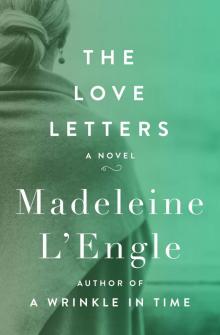 Love Letters
Love Letters The Summer of the Great-Grandmother
The Summer of the Great-Grandmother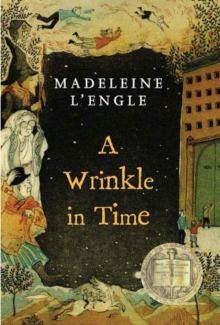 A Wrinkle in Time
A Wrinkle in Time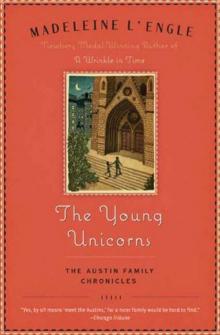 The Young Unicorns
The Young Unicorns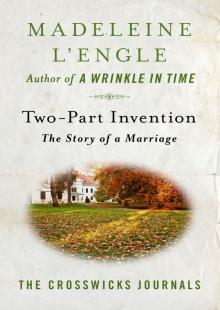 Two-Part Invention: The Story of a Marriage
Two-Part Invention: The Story of a Marriage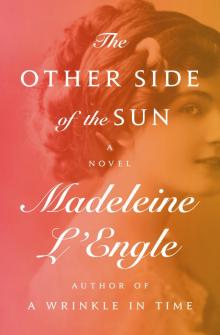 The Other Side of the Sun
The Other Side of the Sun A House Like a Lotus
A House Like a Lotus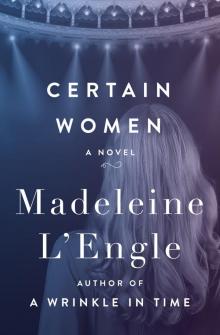 Certain Women
Certain Women Many Waters
Many Waters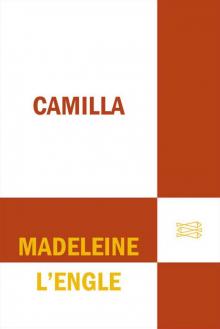 Camilla
Camilla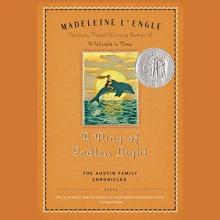 A Ring of Endless Light
A Ring of Endless Light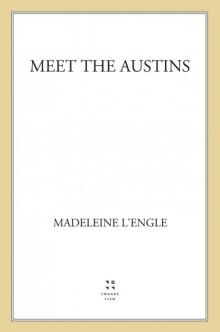 Meet the Austins
Meet the Austins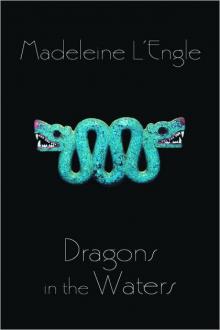 Dragons in the Waters
Dragons in the Waters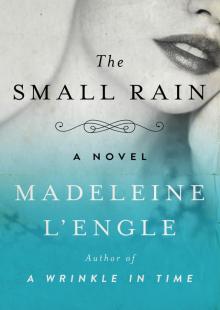 The Small Rain
The Small Rain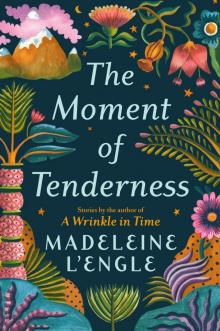 The Moment of Tenderness
The Moment of Tenderness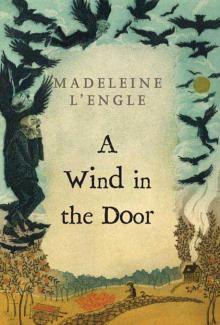 A Wind in the Door
A Wind in the Door Miracle on 10th Street
Miracle on 10th Street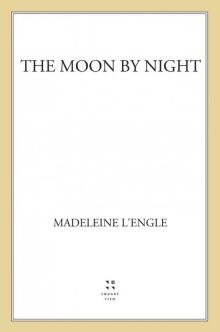 The Moon by Night
The Moon by Night A Swiftly Tilting Planet
A Swiftly Tilting Planet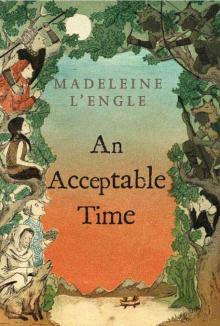 An Acceptable Time
An Acceptable Time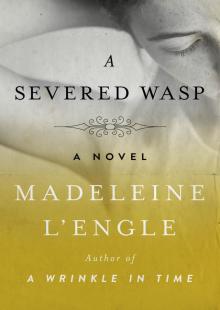 A Severed Wasp
A Severed Wasp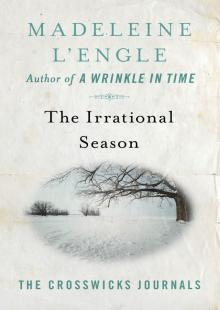 The Irrational Season
The Irrational Season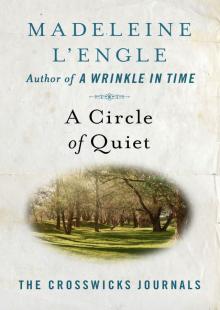 A Circle of Quiet
A Circle of Quiet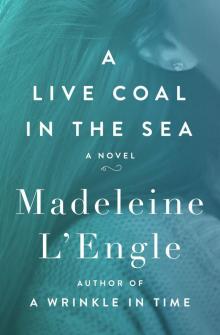 A Live Coal in the Sea
A Live Coal in the Sea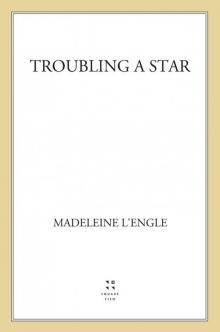 Troubling a Star
Troubling a Star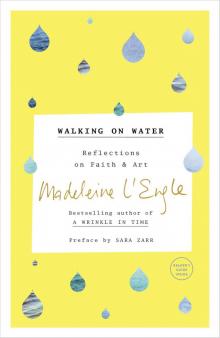 Walking on Water: Reflections on Faith and Art
Walking on Water: Reflections on Faith and Art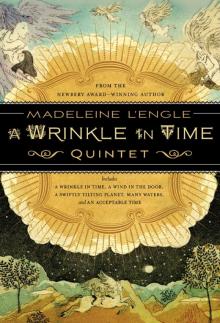 A Wrinkle in Time Quintet
A Wrinkle in Time Quintet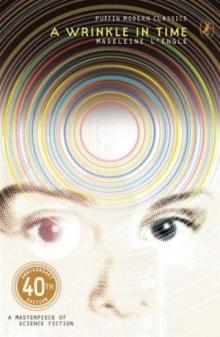 Wrinkle in Time
Wrinkle in Time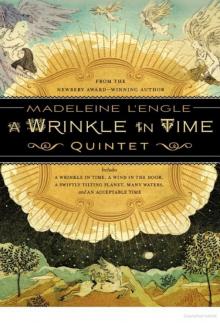 The Wrinkle in Time Quintet
The Wrinkle in Time Quintet Intergalactic P.S. 3
Intergalactic P.S. 3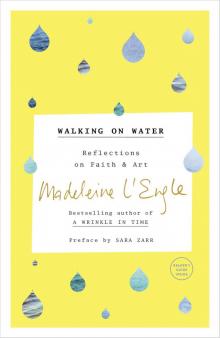 Walking on Water
Walking on Water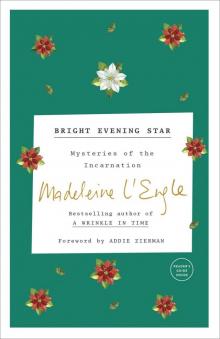 Bright Evening Star
Bright Evening Star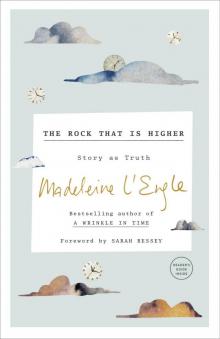 The Rock That Is Higher
The Rock That Is Higher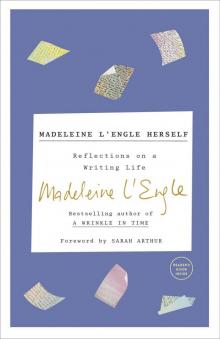 Madeleine L'Engle Herself
Madeleine L'Engle Herself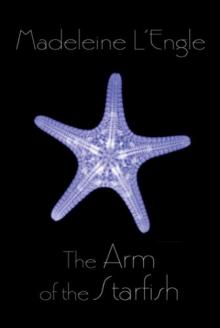 The Arm of the Starfish
The Arm of the Starfish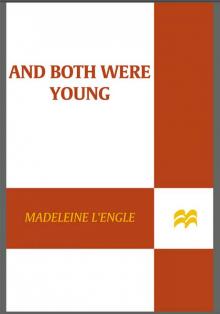 And Both Were Young
And Both Were Young The Twenty-four Days Before Christmas
The Twenty-four Days Before Christmas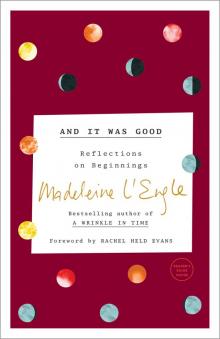 And It Was Good
And It Was Good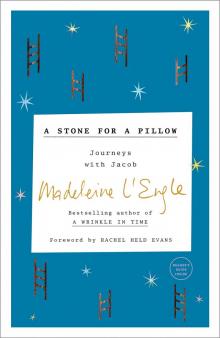 A Stone for a Pillow
A Stone for a Pillow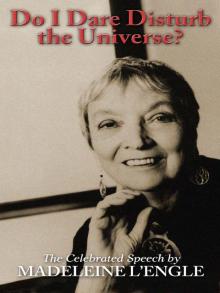 Do I Dare Disturb the Universe?
Do I Dare Disturb the Universe?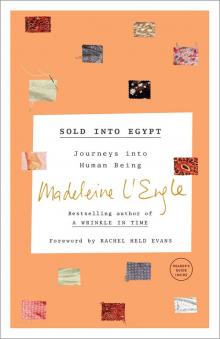 Sold into Egypt
Sold into Egypt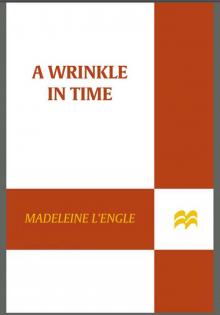 A Wrinkle in Time (Madeleine L'Engle's Time Quintet)
A Wrinkle in Time (Madeleine L'Engle's Time Quintet)